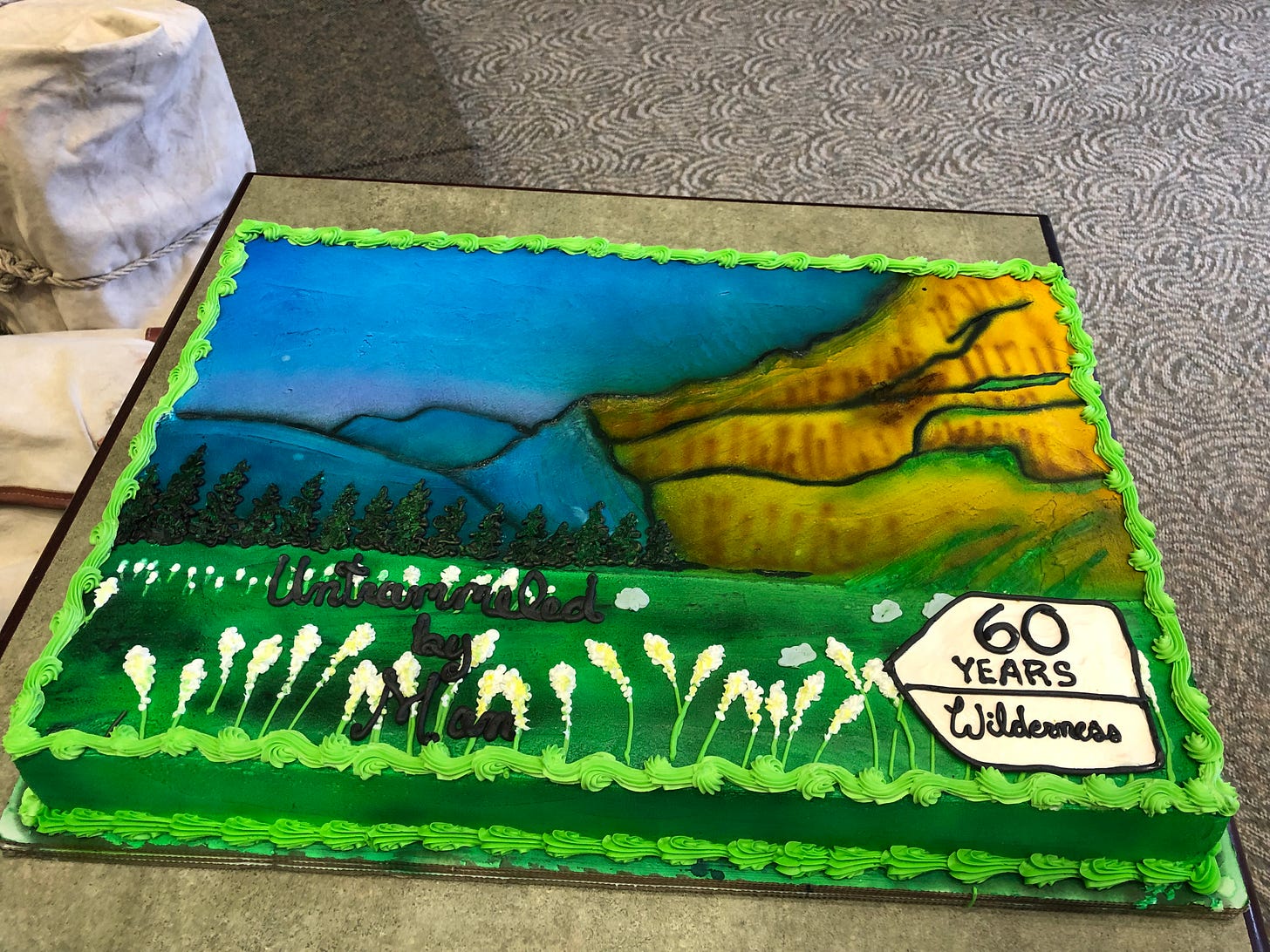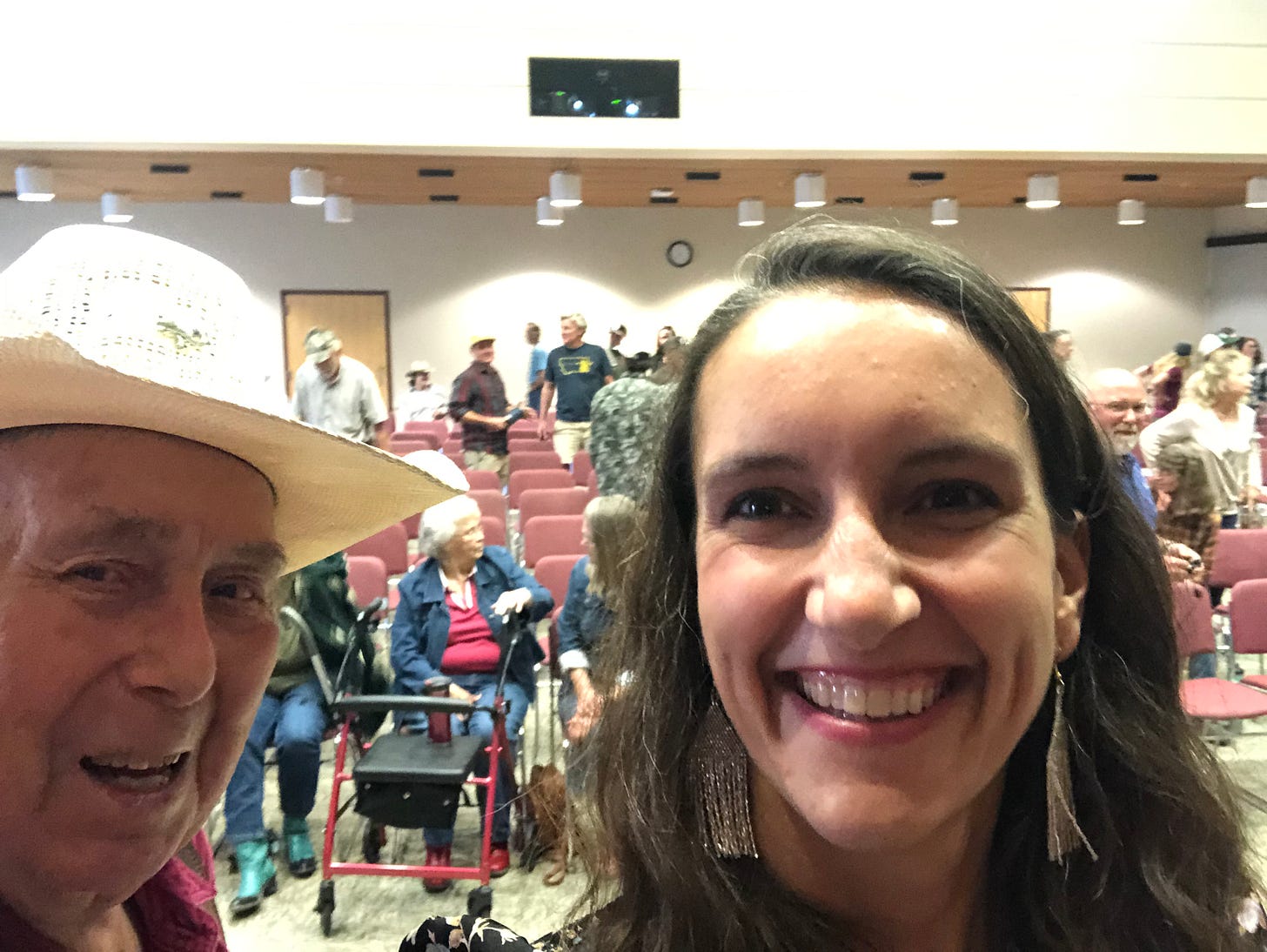Worthy Wilderness
Honoring the Wilderness Act at 60, a virtual event, reviews and more!
Last Tuesday, Smoke, Thelma, and I drove up to the Flathead Valley to celebrate the 60th Anniversary of the Wilderness Act. The event was co-sponsored by the Natural Resources Conservation and Management Program, the Bob Marshall Wilderness Foundation, the Back Country Horsemen of the Flathead and the Montana Conservation Elders. Around a 120 people at the Flathead Valley Community College joined us to listen to Smoke, one of the last living witnesses of how the Wilderness Act came about and has changed.
The moment felt important. Wilderness, the last sacred sanctuary for our human spiritual and mental health and well-being, where wildlife, clean air and water is more important than economic need and greed, has become more of a whisper than the battle cry of the past over the last few years. Some tell me, 111 million protected acres is enough, what’s the point if we can’t cut the trees or mine? Others, don’t like it because they are not allowed to ride their bike or snowmobile on the trails. Wilderness, the most important critique, was purposefully designed, perceived and understood today as a human-free space, excluding indigenous people and removing them and their cultural practices from their homeland. Until last Tuesday, I often caught myself replacing the word Wilderness in my talks or writing with “wild lands” so all friends would feel welcome and respected. But it just didn’t feel right.
I love going down a good rabbit hole. And so I jumped in. Re-reading books and articles, finding new inclusive perspectives and ideas, expanding the meaning of wilderness to include indigenous knowledge and wisdom. There is no question, our understanding and practice of wilderness has to continue to evolve. Humans have always been and will always be deeply connected to our natural world. But different to indigenous language, wilderness is the only word in the English (or German) language that puts nature first. I spent weeks in the mountains and by the river this summer, letting the wind stroke my face when the sun came up, watching my daughter and her friend spend hours giggling, catching fish with willow poles, being free, their happiest selves when riding their horses down the trail. My family taking a desperately needed deep breath after a difficult spring. I found that the answer was right in front of me all along, in the stories of HUSH OF THE LAND and my own. It is deep in anyone’s heart who shrank to the appropriate size under those mountains and radiates from those lucky enough to have spent a lifetime in wilderness, like Smoke Elser but many others too. So this is what I came up with and shared with the audience in Kalispell on Tuesday:
“The Wilderness Act was written at a different time. 60 years ago, on September 3, 1964, President Lyndon B. Johnson put 9 million acres of land under permanent protection by the U.S. Congress with a stroke of his pen. It was just a few weeks after he signed the Civil Rights Act into law and a little bit less than a year after his predecessor, President John F. Kennedy, who was deeply involved in both bills, was shot. Although the Wilderness Act like so many laws at the time and today, was the work of hard-fought compromise, a lot of people didn’t have a voice in the process. After it was passed, some fought even harder to have one and they succeeded. The Confederated Salish and Kootenai Tribes, driven by three remarkable women - Annie Pierre, Christine Woodcock, and Louise McDonald - with strong convictions, used some ideas of the Wilderness Act to set aside the first tribal Wilderness in the Mission Mountains. The Act motivated thousands to work for more protections for the land they loved, connected to and respected across Montana and the nation. Today, the Wilderness Act encompasses 111 million acres in the United States and Puerto Rico.
Without the Wilderness Act of 1964, neither Smoke, I, nor, I am guessing, many of you would be sitting here today. Instead of the trail that he rode on his first pack trip in the Bob Marshall more than 60 years ago, a train might take you up the North Fork of the Blackfoot River towards the Danaher Valley. I would imagine, a small, beautiful, highly desirable mountain town, with a private airplane strip and houses none of us could afford. There may never been “A River Runs through It” because hydroelectric dams would inhibit the world class trout habitat the Bob Marshall is famous for today. But you could take some turns at the ski-area the Forest Service had planned to permit on Scapegoat Mountain and drive up with your car to Webb Lake and camp without having to walk far. I am sure there would be many tracts of large private land, inaccessible by anyone to hunt, fish, see a wolverine, lynx, elk or Grizzly bear, if they would still live there.
Because of the Wilderness Act, we can experience this land today not as separate, exotic or remote from us although it might feel that way at first for many people today, without a car, hotel or ski area. Below these mountains, we shrink to the appropriate size and understand the land as a sovereign, sacred place, worthy of our hard-fought protection and respect.
Without the Wilderness Act there would be no need for mules, the semi-trucks of the back country, or a guide like Smoke to bring people into the mountains they would otherwise never visit. Instead of becoming the outfitter exactly 60 years ago, Smoke might have been the forester he wanted to be when he first came to Montana from Ohio right after high school. Or a train conductor. Who knows.
I would certainly not be here. Smoke and I would have never met in his barn because I wanted to learn from him how to pack a mule. Without the Wilderness Act, few people would pack mules anymore, there would be no need. Instead, I stepped in the old stone barn with the red doors in Missoula eight years ago on a cold January morning, and it changed my life. 20 000 miles from where I grew up, I found a home and a unique friendship. Smoke is a gifted teacher (that runs in the family by the way). It took me a while to learn the ropes, much longer than the Navy SEALs or U.S. Special Forces, but I will never forget the first story he told me. It is called “Mysterious Boxes” in the book. The story is so good – my hair still stands up when I think about what happened on the top of Jumbo Mountain in July 1969. And I knew in my heart what I had to do. Record these stories so others can experience the Bob Marshall Wilderness with Smoke who might otherwise not.
I never rode a horse alongside Smoke, but writing this book I traveled every trail of the Bob Marshall Wilderness with him so you can do to. We are grateful that all trails traveled in this book and beyond are on the indigenous territories of the Blackfeet and Salish Kootenai people. May our shared wisdom carry the future of our last wild places.”
I closed with reading chapter 4 of HUSH OF THE LAND called “A mule, a train and the fight for Wilderness”, followed by Smoke taking us on a trip up the Middle Fork of the Flathead River in early June. The snow was deep, the water high, and the sky blue. It felt like a new beginning.
Auf bald,
Eva
P.S. I highly recommend reading the THE HE SAPA DECLARATION : On Sovereignty and Wilderness: Deepening the Wilderness Concept Through Indigenous Knowledge and Wisdom (p. 41) proposed and passed on the 12th World Wilderness Congress on He Sápa, the sacred territory of the Oceti Sakowin/Rapid City, South Dakota, August 25-31, 2024.
EVENTS & NEWS
After more than a dozen events, our HUSH OF THE LAND book tour is coming to an end. What a wild ride it was. HUSH OF THE LAND has been sold widely and more than one thousand people joined us since March! Thank you all for coming and reading HUSH OF THE LAND Make sure to catch us on our last few storytelling & readings of the year!
Ovando, MT, October 19 (new date!), 4pm, Ovando School Gym
Seeley Lake, MT, December 6, Community Foundation Bldg, 2pm, hosted by Alpine Artisans
FIRST Virtual HUSH OF THE LAND Storytelling & Reading with book signing at the end of September!
We are working on our first virtual HUSH OF THE LAND event, a live stream of Smoke Elser storytelling and my reading straight from the barn to your home at the end of September. Order your books (early Christmas presents?) through Fact & Fiction soon to get them signed at the event. Stay tuned!
NEWS
A book excerpt of HUSH OF THE LAND is published as “A mule, a train and the fight for Wilderness” in the fall 2024 issue of the Montana Magazine of Western History!
Read this great tribute to Smoke and HUSH OF THE LAND by Tristan Scott of the Flathead Beacon “Chronicling the Wilderness Act at 60”
“It’s a beautifully written book and every chapter is an engaging read. A good book should be like an onion, peeling apart layers of the story as one goes and Elser and Maggi have done a masterful job of that.” Thank you for taking HUSH OF THE LAND into the mountains this summer (no worries about spilling your tea on the front page!) and writing this wonderful review, Chris Peterson! Read Chris’ full review in the Hungry Horse News here.
HUSH OF THE LAND was also reviewed in the Montana Quarterly this summer.
ISSUE ALERT! Big Sky Journal will publish Smoke and my origin story - how we met and I got to write his book - this fall! Stay tuned.
Find HUSH OF THE LAND on Facebook and Instagram and write a review on Goodreads or Amazon.








